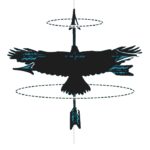TW: drowning
In his final years, my father didn’t like being around children other than his own grandchildren, who knew enough not to stare at his deterioration. He was Papa. And Papa was who he wanted to be when they stared back—not the man with fifty years of steroids pumped into his body to battle Crohn’s Disease, slowly chipping away at his intestines, and leaving his skin so thin, the sun took its final payment in the form of cancer. It wasn’t pretty. The end never is.
The summer before he died, I visited him in California. We stayed at the beach all day watching the kids play and swim in the ocean.
“Don’t turn your back on the wave!” my father yelled. “Go out!” He motioned for my son to dive headfirst into the water, to resist the urge to scramble to shore. He sat low in his beach chair, hiding under a large lifeguard hat, his body covered with towels to protect him from a sun that had already set upon him, bruising his skin. In the sand between us was a sundial he’d made, teaching the kids how to tell time with nothing but a bare seagull feather and shadows. Every now and then, he’d flick a shell at me when I wasn’t looking and chuckle.
“Do you remember the waves the summer those little kids died?”
He nodded. “Slammed them right into the rocks at the wedge.”
I was barely a teenager when I stood on the beach watching lifeguards pull the limp, lifeless bodies to shore. Their mother had left them to swim alone in front of the lifeguard stand. Now they lay on the wet sand with a halo of strangers over them, all slack-jawed and stupid in their beach hats and zinc oxide; no one claimed the children as their own, the lifeguard pounding on their little chests. They had sand in their hair and on their faces like shells washed ashore, and I waited for the piercing scream, for someone to break through the crowd and wail, declaring the injustice of it all. Instead, they were quickly and quietly lifted into an ambulance and taken away as the waves drowned out the whispers of strangers.
After all those years, I tried imagining the mother cooking in a kitchen somewhere in Southern California, humming along to a shitty song on the radio, but I couldn’t. I couldn’t imagine her being able to do anything. I only saw the waves, pounding, relentless, having no memory of what they had taken from the world, while we were left on shore to absorb them like shells carrying around an echo.
“I wonder what she’s doing now. Every time I come to this beach, I wonder that.”
“Maybe she’s doing what we’re doing, watching the sun set.”
“Is that possible? Would you be able to enjoy a sunset, at a beach no less, after something like that?”
My father was smiling, had been smiling all day watching the kids play at the ocean’s edge. It was as if the rest of him had peeled away and only his eyes were left to watch the sun drop like a lump of hot coal into the ocean. He didn’t need an able body for that—not to see something beautiful. The ocean has no memory of what it takes. The waves will swell and retreat. The sun will continue to dissolve into the horizon. And maybe that’s what makes it raw and wild and worth the view.
—
Sabrina Hicks lives in Arizona. Her work has appeared in Synaesthesia, The Sunlight Press (forthcoming), Third Point Press, Literary Mama, Writer’s Digest, and 100 Word Story. More of her work can be found at sabrinahicks.com.
Artwork by: lachslove
lachslove is a multigenre photographer with a focus on artistic landscape photography. Based in Leipzig, Germany, he seeks to capture landscapes by coming up with innovative photo techniques and using his old cameras. For him photography is made in the moment It transports in a specific and special point of view. There is a big potential to bring feelings about that special point of view to another person. Where words end, pictures begin.
Links
Instagram: @lachslove_

